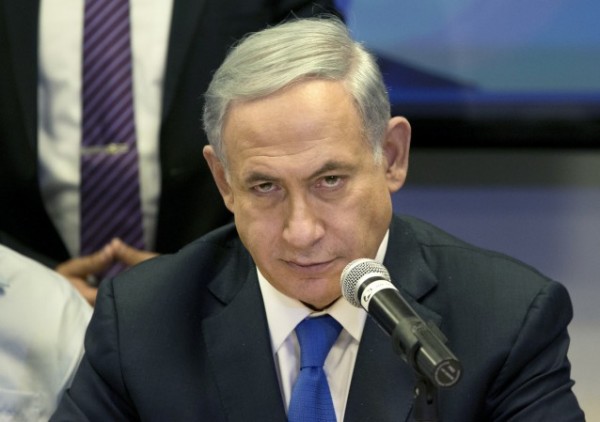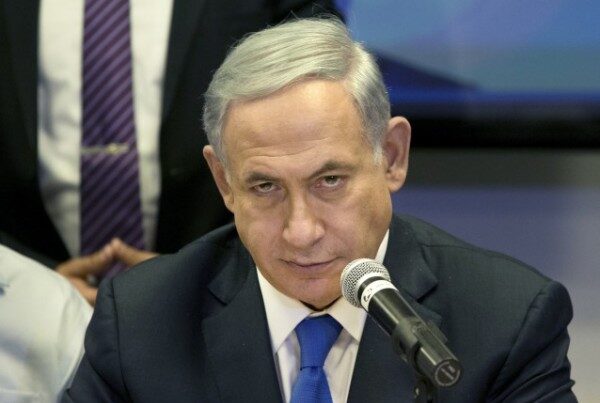 In a 2009 speech at Bar-Ilan University, Israeli Prime Minister Benjamin Netanyahu stunned many of his right-wing supporters by announcing that he was willing to accept the creation of an independent Palestinian state.
In a 2009 speech at Bar-Ilan University, Israeli Prime Minister Benjamin Netanyahu stunned many of his right-wing supporters by announcing that he was willing to accept the creation of an independent Palestinian state.
“I turn to you, our Palestinian neighbors, led by the Palestinian Authority, and I say: Let’s begin negotiations immediately without preconditions,” Netanyahu said. “In my vision of peace, in this small land of ours, two peoples live freely, side-by-side, in amity and mutual respect.”
Then, in the run-up to an election many thought he would lose, the prime minister reversed course and said a two-state solution was no longer viable.
“I think that anyone who is going to establish a Palestinian state today and evacuate lands is giving attack grounds to the radical Islam against the State of Israel,” Netanyahu told the news site NRG. “Anyone who ignores this is sticking his head in the sand.”
On Thursday, in what appears to be another reversal, Netanyahu said he still supported the idea of a Palestinian state.
“I haven’t changed my policy. What has changed is the reality,” Netanyahu told MSNBC’s Andrea Mitchell. “I don’t want a one-state solution; I want a sustainable, peaceful two-state solution, but for that, circumstances have to change.”
Call it Bibi’s flip-flop flip. Some have dismissed Netanyahu’s pre-election change of heart as an appeal to right-wing Israeli voters in advance of what was thought to be a neck-and-neck contest with the leftist Labor Party. In the end, Netanyahu’s Likud Party surged to an easy victory that will almost certainly keep the prime minister in power for a record fourth term.
Netanyahu’s latest reversal is a clear attempt to improve ties with the White House, which have plunged to historic lows because of sharp disagreements over Iran and the peace process — and because the Israeli leader and President Barack Obama make little attempt to hide their personal animosity. The White House said Obama reiterated his support for a two-state solution in a phone call with the prime minister Thursday afternoon. But the initial public response from the administration offered a vivid reminder of just how little Obama and his aides trust Netanyahu, and of how much further the Israeli leader will have to go to persuade them that he’s changed his stripes once again.
“We believe he changed his position just a few days ago,” State Department spokeswoman Jen Psaki said at a Thursday briefing. “Certainly the prime minister’s comments from a few days ago brought into question whether he … remains committed [to a Palestinian state].”
Unhappy with Jerusalem’s response to his peacemaking efforts, Obama may soon try his luck in Turtle Bay. On Wednesday, Foreign Policy reported that the White House was weighing whether to support a U.N. Security Council resolution that would call for the resumption of political talks to conclude a final peace settlement. That would be a major change: Washington has for years provided Israel with diplomatic cover at the U.N. despite fears that Netanyahu was never truly committed to the formation of a Palestinian state.
The concept of a peace deal framed around the formation of an independent Palestine has been around for decades, and Netanyahu has been involved in the on-again, off-again talks for years.
And despite his hard-line rhetoric, Netanyahu is actually one of the only Israeli leaders to ever sign a formal agreement with the Palestinians: In 1998, then-Prime Minister Netanyahu and Palestine Liberation Organization Chairman Yasser Arafat agreed to the Wye River Memorandum, whichinvolved limited withdrawals from the West Bank and Gaza Strip and the expansion of Palestinian control over portions of both territories. Many Jewish settlers and right-wing politicians have never forgiven Netanyahu for the deal because it involved ceding some authority over Hebron, one of the holiest cities in Judaism.
In recent years, Netanyahu has been following a very different path. In 2014, nine months of talks initiated by Secretary of State John Kerry aimed at restarting the peace process collapsed. U.S. State Department envoy Martin Indyk blamed Israeli settlement activity in the occupied West Bank as the key reason the peace effort failed, while the State Department said that “both sides did things that were incredibly unhelpful.”
Netanyahu’s latest change of heart came after the White House openly criticized him and his Likud Party for what it called “divisive” anti-Arab rhetoric during its campaign. European leaders expressed alarm after he dropped his support for a Palestinian state just days ago. The European Union called on him to make a firm commitment to two states at a “crucial moment.”
Foreign Policy


Leave a Reply
You must be logged in to post a comment.